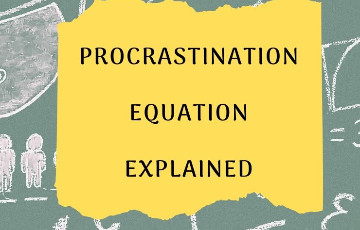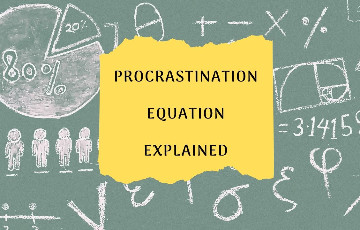
By identifying which part of the equation is giving you trouble, you can easily overcome procrastination.
1. More Impulsiveness = Increased Procrastination.
Impulsiveness includes:
- Don’t know what to work on next.
- Don’t know where to get started.
- Don’t know how to proceed after starting.
- Keep getting distracted. Distraction can be made by yourself or by your peers.
- Keep getting interrupted. Interruptions caused by peers are high compared to self-interruptions.
- Too many things to do.
- Uncomfortable work environment.
How to overcome Impulsiveness?
Good planning, Fixed Work-hours without interruptions, muting notifications, and staying away from the internet is helpful. Shift to a positive work environment.
2. More Delay = High Procrastination.
Few examples of delays that start procrastination are:
- The Rewards that are far away.
- Having vague goals.
- Very distant goals.
- The Lengthy projects.
- No timely recognition and appreciation.
How to overcome Delay?
Chunk the projects. Have your own deadlines and self-targets. Setting simple goals and achievable targets is important to beat procrastination.
3. More value = Motivation. No Procrastination
Few examples of High value and Low value include:
- Passionate projects are of value to you. You will not procrastinate.
- The subject of interest, a field of interest stops procrastination.
- Too difficult, boring, and unclear tasks bring a low-value score. You procrastinate.
How to bring more value?
Begin your work in the areas you like to gain momentum and motivation.
4. Optimistic Expectations = Motivation. Low Procrastination.
Few examples of low expectancies to avoid include:
- Fear of failure, criticism
- Lack of self-confidence
- Fear of judgments from others
How to overcome Expectancy?
Think about ‘I can try instead of I don’t think I can do it.’ It is important for boosting your confidence. Do it for yourself. It’s better to make an effort instead of procrastinating.

Dr. Piers Steel planned the Procrastination Equation. He built the equation based on 4 important variables and 5 Important Criteria that affect your motivation and procrastination.
Procrastination Equation is:
MOTIVATION = EXPECTANCY * VALUE / IMPULSIVENESS * DELAY
The four important variables:
Expectancy: It refers to how much you expect to succeed in a particular task? What is expected out of a task? What is your expectation? Etc. If expectations are high, we procrastinate less when compared to tasks and activities having a low expectancy.
Value: Value refers to meaning, benefits, purpose, feeling content, gaining moral-boost, improving self-confidence. Tasks that hold high value and adds meaning to you will bring motivation. It stops you from procrastinating.
Impulsiveness: Easily getting distracted, unable to stay focused, looking for instant-gratification are all a few examples of serious impulsiveness leading to procrastination.
Delay: If there are lengthy delays with a task, you will eventually start procrastinating.
The 5 important criteria:
- If you want to overcome procrastination, you need to increase the “Expectancy” and “Value” of a task. If your expectation about a task is high and optimistic, and if you find it worthwhile, you are more likely to finish the task. You will stay motivated. The chance of procrastinating will be minimal.
- If your task has a good “value” to it, it is enough to stay motivated. There will be no procrastination when what you do gives you meaning and value.
- Decrease the “Impulsiveness” and “Delay” habits to overcome procrastination.
- Tasks with “Less Value” and “High Expectancy” increase procrastination chances.
- More Impulsiveness and More Delay decrease your motivation leading to procrastination.
Procrastination Equation gives a clear picture of identifying what causes procrastination. It is highly useful for people who can’t figure out why they are procrastinating.


